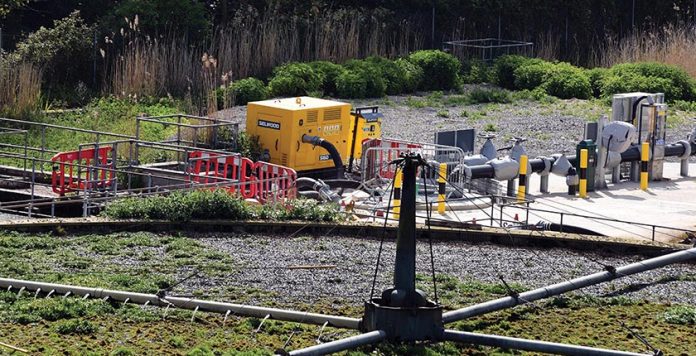Wessex Water’s recycling centre at Tetbury, Gloucestershire, contains a biofilter treatment plant which is used to remove nitrates from sewage, to improve the quality of wastewater and minimise risk to the environment.
The filters are fed from a dosing syphon chamber at fixed rates and flow volumes. The system is gravity fed with no moving parts and was housed in a brickwork chamber which was built in the 1970s. The chamber was badly in need of replacements due to leaks and unstable foundations.
YTL Engineering and Construction (YTL E&C) was tasked with replacing the chamber with a new concrete structure and syphon unit. Because of the gravity-fed nature of the syphon system, the new chamber had to be built on the footprint of the existing one. The filters, as a critical part of the water treatment process, needed to remain running for the duration of the rebuild – so a pumping system was needed that could mimic the gravity-fed device with 100% reliability.
The Challenge
There were a number of challenges to be overcome. The pump setup had to replicate the original system by feeding at a fixed rate that would not overwhelm the filter capacity but be sufficient to rotate the filter arms which were moved by water pressure alone. Insufficient pressure would cause a compliance failure due to uneven flow distribution. The pumps also had to feed the filters only intermittently, as constant flow causes failures of filters due to the biological elements not receiving oxygen from the air.
The location of the site also presented a challenge – on a hill with limited access for plant and no practical options for refuelling if diesel pumps were used.
Working closely with Wessex Water and YTL E&C, Selwood used a disused storm chamber to house electric submersible pumps. The chamber was repaired to form a sump for the pumps, and the syphon feed was diverted into it. Due to a lack of power options in the area, Selwood’s pumps operated on a duty standby basis from generators provided by Power Electrics.
These pumps were controlled with ultrasonic level control and alarm telemetry to deliver flows equally to the two filters at fixed volumes and variable flow rates, dependent on incoming flows to the works as a whole.
Initial results were unsatisfactory as the filters adapted to the temporary system. Liaison between parties established further requirement for a recirculation pump to dilute the flows and provide a second pass for a flow rate of 20l/s. Mindful of the cost, a Selwood S150 electric Super Silent pump was used to provide this function as this could safely use the site power supply and would not need diesel power. Selwood electricians attended site frequently to make adjustments as advised by the Wessex Water scientist, and to synchronise the pump operations. The site team added an air valve supplied by Selwood in order to provide quicker discharge times to the filter feed pipes to help maintain compliance.
The finalised pumping system was complex and multi-faceted, working within the strict constraints of the site and the operation of the old system.
The result
Once installed, the system ran faultlessly and the site remained in compliance for the duration of the works to rebuild the chamber. There were no mechanical failures, and Selwood’s electricians made regular visits to fine tune the system to keep it reliable and compliant.
The recommendation
Alex Adams of Wessex Water said: “Working with Selwood on this challenging project has been rewarding. Whilst the system that was replaced was simple, its function was complicated and to mimic it with a pumped setup was difficult.
Thanks to close working with Selwood’s Framework Manager, site visits from Selwood electricians and a good understanding of the site requirements from all concerned, it was a great success to develop a system that performed reliably for the project.”



